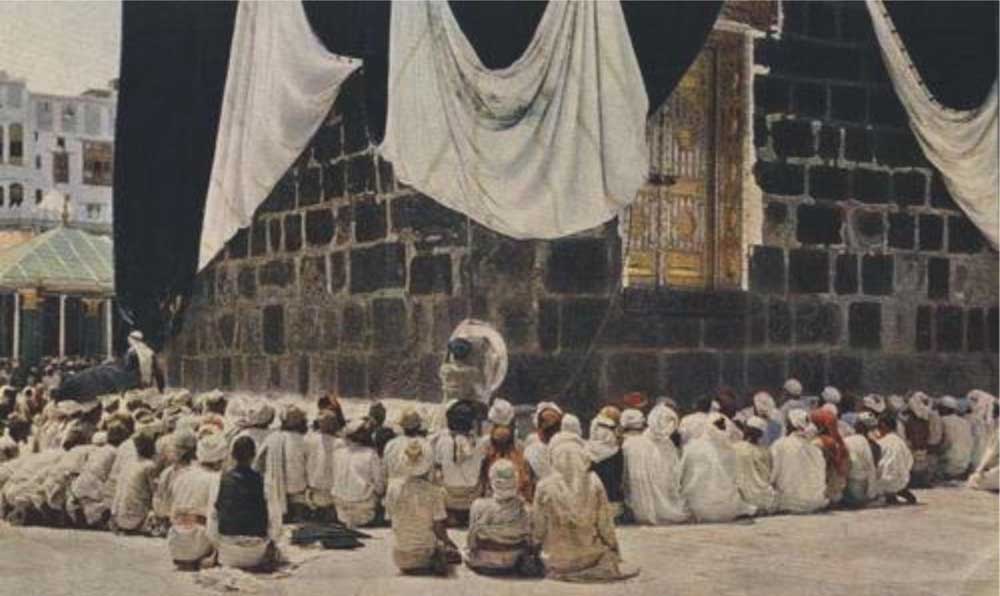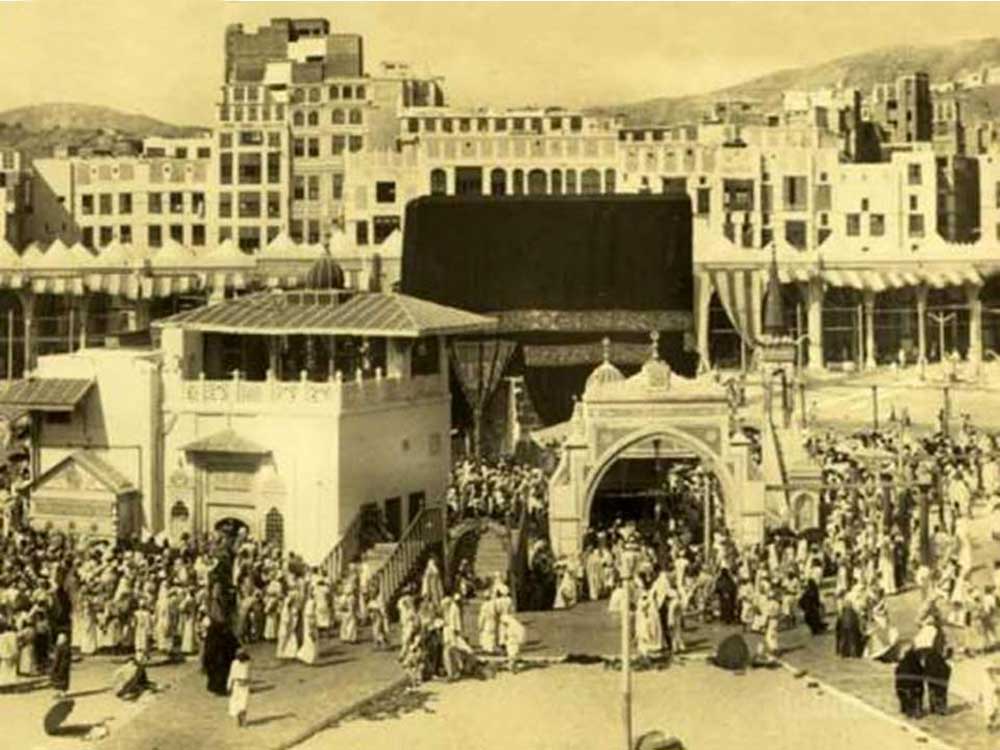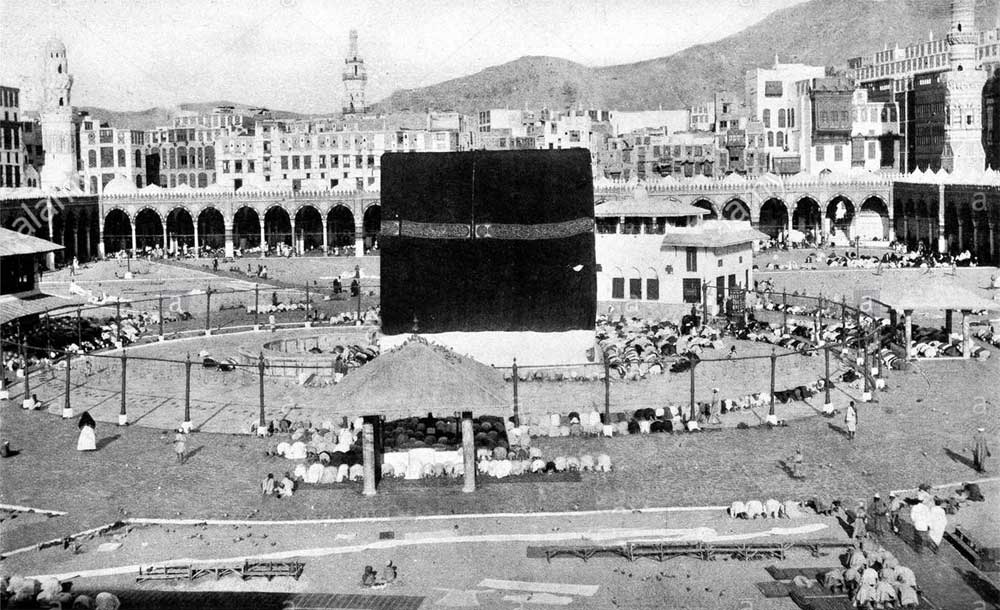Hajj History
According to the correct view, Hajj was made obligatory in 9 AH (i.e., after Hijrah, migration to Medina), the year of the Delegations, in which the chapter of Aal-‘ Imraan was revealed; in which Allah says which means, “ … And (due) to Allah from the people is a pilgrimage to the House – for whoever is able to find thereto a way… ” (Aal-‘ Imraan: 97)
Allah (swt) has revealed in the Quran at Surah 22 verse 27: “ And proclaim to the people the Hajj [pilgrimage]; they will come to you on foot and on every lean camel; they will come from every distant pass.”

So why do we actually perform Hajj? Let’ s take a step back into history to understand why.
Four thousand years ago the valley of Mecca was a dry and uninhabited place. The Prophet Ibrahim (AS) was instructed to bring his wife, Hajira and their child Is' mail to Arabia from Palestine. Allah (swt) told the Prophet Ibrahim (AS) to leave them on their own, and he did so, with some supplies of food and water. However the supplies quickly ran out and within a few days Hajira and Is' mail were suffering from hunger and dehydration.
Hajira placed Is’ mail where she could keep an eye on him (in-between two hills) and in her desperation to look for help she ran up and down the two hills called Safa and Marwa trying to see if she could spot any help in the distance. Finally she collapsed beside Is' mail and prayed to Allah (swt) for deliverance. Is' mail a young child at the time, struck his foot on the ground and this miraculously caused a spring of water to gush forth from the earth. Hajira and Is' mail were saved! This gush of water came to be know as the Zam Zam well.
The Ka' bah is Built
Prophet Ibrahim (AS) was ordered by Allah (swt) to build the Ka’ bah. Prophet Ibrahim (AS) and Is' mail constructed a small stone structure, the Ka’ bah, which was to be the gathering place for all who wished to strengthen their faith in Allah (swt). When the structure of the Ka’ bah was complete, Allah (swt) commanded Prophet Ibrahim (AS) to call the people to Hajj. Prophet Ibrahim (AS) pleaded, " O Allah! How shall my voice reach all of those people?" Allah (swt) told him that his duty was only to give the call and it was up to Allah (swt) to make it reach the people. Prophet Ibrahim (AS) then climbed Mount Arafat and called out in his loudest voice, " O People! Verily Allah has prescribed upon you Hajj, so perform Hajj.”

After building the undefined, Prophet Ibrahim would come to Mecca to perform Hajj every year, and after his death, this practice was continued by his son. However, gradually with the passage of time, both the form and the goal of the Hajj rites were changed. As idolatry spread throughout Arabia, the undefined lost its purity and idols were placed inside it. Its walls became covered with poems and paintings, including one of Jesus and his mother Maryam and eventually over 360 idols came to be placed around the undefined.
During the Hajj period itself, the atmosphere around the sacred precincts of the undefined was like a circus. Men and women would go round the undefined naked, arguing that they should present themselves before Allah in the same condition they were born. Their prayer became devoid of all sincere remembrance of Allah and was instead reduced to a series of hand clapping, whistling and the blowing of horns. Even the talbiah was distorted by them with the following additions: ' No one is Your partner except one who is permitted by you. You are his Master and the Master of what he possesses' .
Sacrifices were also made in the name of God. However, the blood of the sacrificed animals was poured onto the walls of the undefined and the flesh was hung from pillars around the undefined, in the belief that Allah demanded the flesh and blood of these animals.
Singing, drinking, adultery and other acts of immorality was rife amongst the pilgrims and the poetry competitions, which were held, were a major part of the whole Hajj event. In these competitions, poets would praise the bravery and splendor of their own tribesmen and tell exaggerated tales of the cowardice and miserliness of other tribes. Competitions in generosity were also staged where the chief of each tribe would set up huge cauldrons and feed the pilgrims, only so that they could become well-known for their extreme generosity.
Thus the people had totally abandoned the teachings of their forefather and leader Prophet Ibrahim. The House that he had made pure for the worship of Allah alone, had been totally desecrated by the pagans and the rites which he had established were completely distorted by them. This sad state of affairs continued for nearly two and a half thousand years. But then after this long period, the time came for the supplication of Prophet Ibrahim to be answered:
"
Our Lord! Send amongst them a Messenger of their own, who shall recite unto them your aayaat (verses) and instruct them in the book and the Wisdom and sanctify them. Verily you are the '
Azeezul-Hakeem [the All-Mighty, the All-Wise]."
[Surah Al-Baqarah 2:129]
Sure enough, a man by the name of Muhammad ibn ' Abdullaah was born in the very city that Prophet Ibrahim had made this supplication centuries earlier. For twenty-three years, Prophet Muhammad spread the message of Tawheed [true monotheism] - the same message that Prophet Ibrahim and all the other Prophets came with - and established the law of Allah upon the land. He expended every effort into making the word of Allah supreme and his victory over falsehood culminated in the smashing of the idols inside the undefined which once again became the universal center for the worshippers of the one True God.
Not only did the Prophet rid the undefined of all its impurities, but he also reinstated all the rites of Hajj which were established by Allah' s Permission, in the time of Prophet Ibrahim. Specific injunctions in the Quran were revealed in order to eliminate all the false rites which had become rampant in the pre-Islamic period. All indecent and shameful acts were strictly banned in Allah' s statement:
"
There is to be no lewdness nor wrangles during Hajj."
[Surah al-Baqarah 2:197]
Competitions among poets in the exaltations of their forefathers and their tribesmen' s achievements were all stopped. Instead, Allah told them:
"
And when you have completed your rites [of Hajj] then remember Allah as you remember your forefathers;
nay with a more vigorous remembrance."
[Surah al-Baqarah 2:200]
Competitions in generosity were also prohibited. Of course, the feeding of the poor pilgrims was still encouraged as this was done during the time of Prophet Ibrahim but Allah commanded that the slaughtering of the animals which was done for this purpose should be done seeking the pleasure of Allah rather than fame and the praise of the people. He said:
"
So mention the name of Allah over these animals when they are drawn up in lines. Then, when they are drawn on their sides [after the slaughter], eat thereof and feed the beggar who does not ask, and the beggar who asks."
[Surah al-Hajj 22:36]
As for the deplorable practice of spattering blood of the sacrificed animals on the walls of the undefined and hanging their flesh on alters, then Allah clearly informed them that:
"
It is neither their meat nor their blood that reaches Allah, but it is Taqwaa (piety) from you that reaches Him."
[Surah al-Hajj 22:37]
The Prophet also put a stop to the practice of circling the undefined in a state of nudity and the argument that the pagans put forward to justify this ritual was sharply rebutted in Allah' s question:
"
Say: Who has forbidden the adornment [i.e. clothes] given by Allah which He has produced for His Slaves?"
[Surah al-A'
raaf 7:32]
Another custom which was prohibited through the Quran was that of setting off for Hajj without taking any provisions for the journey. In the pre-Islamic period, some people who claimed to be mutawakkiloon (those having complete trust in Allah) would travel to perform Hajj begging for food through the whole journey. They considered this form of behavior a sign of piety and an indication of how much faith they had in Allah. However Allah told mankind that to have sufficient provisions for the journey was one of the preconditions for making Hajj. He said:
"
And take a provision [with you] for the journey, but the best provision is at-Taqwaa (piety)."
[Surah al-Baqarah 2:197]

In this way, all the pre-Islamic practices, which were based on ignorance, were abolished and Hajj was once more made a model of piety, fear of Allah, purity, simplicity and austerity. Now, when the pilgrims reach the undefined, they no longer find the carnivals and the frolic and frivolity that had once occupied the minds of the pilgrims there before. Now, there is the remembrance of Allah at every step and every action and every sacrifice was devoted to Him alone. It was this kind of Hajj that was worthy of the reward of paradise, as the Prophet said: " The reward for an accepted Hajj is nothing less than paradise."
May Allah grant us all the ability to visit His House and perform the Hajj in the manner of the Prophet Muhammad . Aameen.